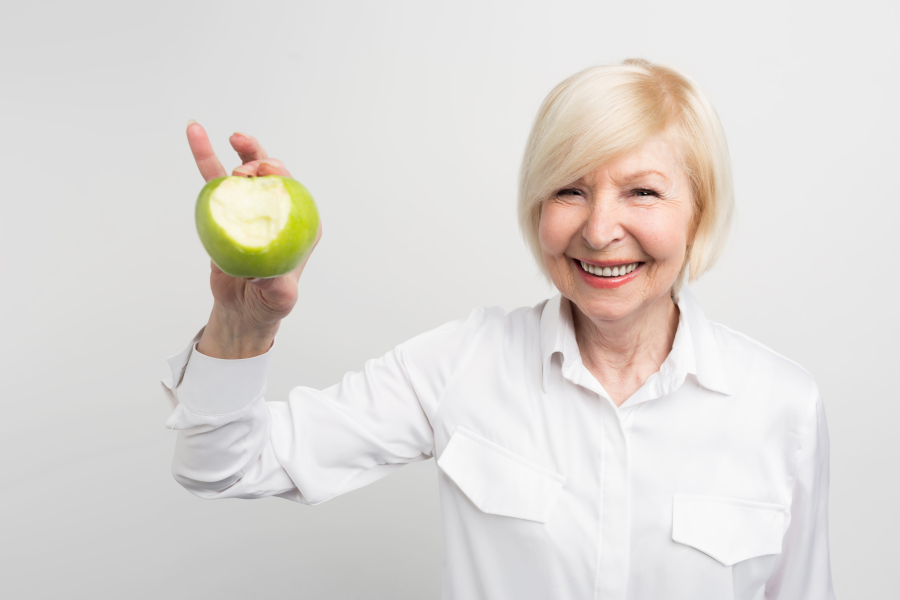Three stages of learning to eat with dentures

Dentures are more common than you think
In 2017 surveys showed roughly 16% of adults in the UK wear dentures, yet the stigma around dentures mean many people are too embarrassed to seek help in learning how to smile, talk and eat properly again. In those early days eating anything other than soup without dribbling all over the place can feel like a pipe dream but we promise, you can and will be able to eat “normal foods” again!
Learn to enjoy food again
Someone once told us that when they first tried eating with dentures it was “like trying to eat with two golfballs in your mouth”, but with practice they reached a point where they can eat pretty much whatever they want. Inspired by their example, we’ve broken down the learning process for eating with dentures to three manageable stages, with pointers on what you need to learn at each stage.
Stage 1 – Soft foods and dealing with heat
If you’ve just got your first denture, your gums are going to be a bit sore as they adjust so you should definitely stick to soft/liquid foods like mash and soups while you adjust to having dentures in your mouth. Also, avoid spicy things in the early stages, you definitely don’t want to get chilli in any sore spots.
If you’ve lost your natural front teeth, you may also find it’s very hard to judge how hot or cold your food is! Learning to recognise the temperature of your food is a vital skill that you should start improving on straight away. As well as looking for obvious visual cues like steam, we suggest you carefully touch your food to your lip to test the heat before putting it in your mouth, that way you’re less likely to scald yourself and ruin your dinner.
Stage 2 – How to chew with dentures
Once you get the hang of eating soft foods well, you’re ready to move on to chewing. With natural teeth, most of us chew on one side of our mouths at a time but if you try that with dentures, you’ll soon find them rocking around and slipping out of place. The key is to chew on both sides at the same time, it will be tricky at first but you will get there and you’ll find it much easier to keep the denture in place as you do.
To make this stage easier for yourself, make sure you chop your food into small, manageable pieces so you can fit food on both sides of your mouth as you eat. We recommend you keep a drink of some sort on hand too, you’ll find it’s a bit tricker to move your food back as you swallow it and having a sip of something on hand will make that less difficult. You should also try to avoid overly sticky foods as these could get stuck to your denture’s teeth which would be very annoying and probably wouldn’t look all that attractive either!
Stage 3 – Push your limits and embrace slow-cooked foods
At this point, you’re pretty much there and the only limit to what you can eat will be determination and how much you’re willing to practice. Missing a classic steak dinner and roast meat are probably the most missed foods among denture wearers but with time these too can be enjoyed again. As you work up to them it’s worth opting for stewed or slow-cooked meats as they tend to be easier to eat, as you become more confident you can slowly work your way up to your old favourites again.
Living with dentures
Learning to live with dentures is an ongoing process that affects more people out there than you’d expect. Some soreness is to be expected as you get used to things but if you find yourself in a great deal of pain that doesn’t go away or your denture hurts you too much to wear, you should book in for a consultation with your local dentist or clinical dental technician (denturist) straight away. In the meantime, you can find a series of supportive products in the Dr Denti home-use range from GAP Dental. Whether your dentures are loose or broken, our Dr Denti range is designed to provide simple, temporary solutions to keep you smiling, eating and enjoying life, even if you can’t get to a dentist right away. For more information on our range of denture products drop us an email at info@gapdental.com or call us on 01474 560 618.